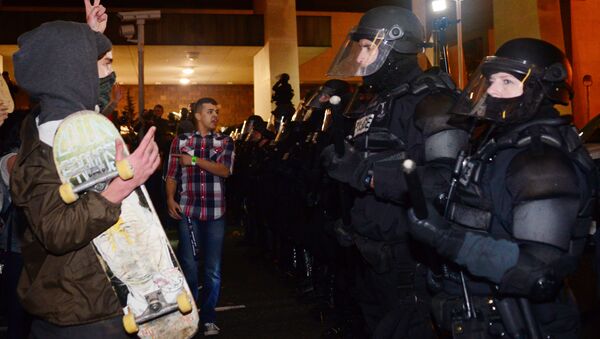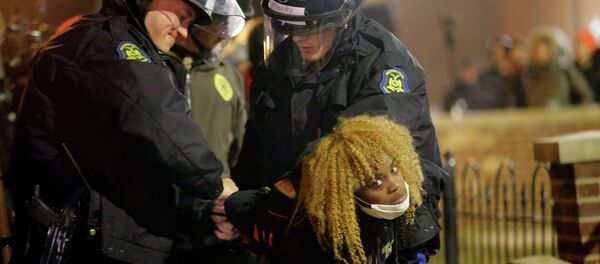On Monday, US President Donald Trump signed an executive order lifting the Obama administration's ban on the Department of Defense 1033 program, which envisaged delivering military equipment to local and state police.
The restrictions came in response to public outcry over the use of heavy military equipment by US law enforcement officers, as well as police racism and brutality during the 2014 protests in Ferguson, Missouri.
Republican Senator Rand Paul slammed the Trump administration's plan and stressed that "the Americans must never sacrifice their liberty for an illusive and dangerous, or false, security."
The politician tweeted that he disagreed with Attorney General Jeff Sessions, who had announced the decision, on the necessity of reviving the Pentagon's 1033 program, warning against an "unprecedented expansion of government power" in the country.
The militarization of our law enforcement is due to an unprecedented expansion of government power in this realm.
— Senator Rand Paul (@RandPaul) 28 августа 2017 г.
It's one thing for fed officials to work w/ local authorities to reduce or solve crime. It's another for them to subsidize militarization.
— Senator Rand Paul (@RandPaul) 28 августа 2017 г.
The American Civil Liberties Union's Kanya Bennett echoed the US politician, condemning "an epidemic… of using excessive force [by police], particularly against people of color, with injuries and deaths mounting" in the United States.
"It defies logic to arm the police with weapons of war — grenade launchers, high-caliber assault weapons and more — but that's precisely what President Trump and Attorney General [Jeff] Sessions have decided to do," she said.
According to Democratic politician Pramila Jayapal, the Ferguson lesson has not been learned; quite the contrary, the US president is seemingly "determined to reverse all of the progress" the US has made.
With Ferguson, the nation saw how disturbing police militarization can be. Trump seems determined to reverse all of the progress we've made. https://t.co/pTPQYvyGdE
— Pramila Jayapal (@PramilaJayapal) 28 августа 2017 г.
Meanwhile, Sessions' announcement was largely endorsed by the FOP [Fraternal Order of Police], an organization consisting of sworn law enforcement officers in the United States.
The organization emphasized that "as a candidate for president, Mr. Trump pledged to rescind these restrictions and Attorney General Sessions delivered on that promise."
The National Sheriffs' Association echoed the FOP saying that they "applauded" Trump's actions.
"We applaud the @POTUS's actions, and we are encouraged to see him acting on this important issue that we have vocally advocated for." https://t.co/Kz3Owf7Ioc
— Nat Sheriffs' Assoc. (@NationalSheriff) 28 августа 2017 г.
The protests further heated the debate about US police racism and brutality. President Obama's ban managed to assuage the debate, which has gained a second wind after clashes during a white supremacist rally in Charlottesville on August 11-12.
The event, aimed against the demolition of a statue of Confederate icon general Robert E. Lee, provoked fierce brawls between right-wing movement participants and counter-protesters. As a result of the clashes one woman died and nearly 20 others were injured.


